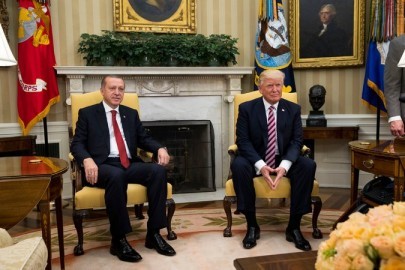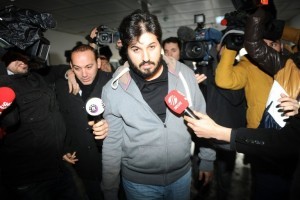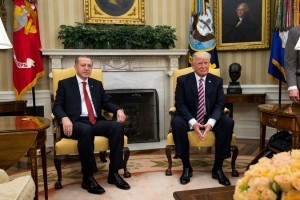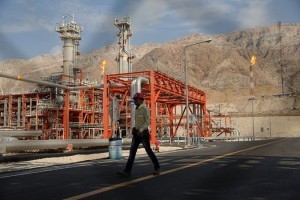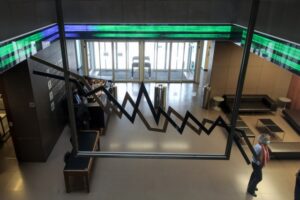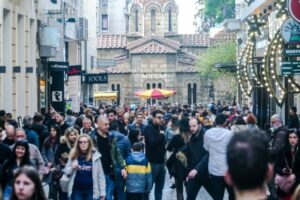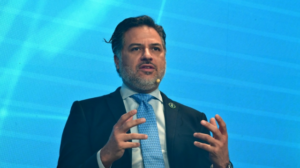The trial is about to start in a Lower Manhattan courtroom, but it is the talk of Turkish government officials, television and even cafes.
Turkey is churning over the prosecution by the American authorities of two prominent Turks accused of conspiring to violate United States sanctions against Iran. After a failed campaign to persuade American officials to drop the case, President Recep Tayyip Erdogan last week turned to damage control, angrily denigrating the whole judicial process.
On Monday, jury selection is to begin in the Federal District Court trial amid broad speculation that the lead defendant, Reza Zarrab, who is accused of managing a billion-dollar scheme to smuggle gold for Iranian oil, has entered into a plea bargain with the prosecution and may reveal damaging evidence about corruption and illegal dealings in high places.
If Mr. Zarrab has indeed become a government witness, prosecutors are still expected to proceed to trial against a co-defendant, Mehmet Hakan Atilla, a Turkish banker who has pleaded not guilty. Seven other defendants have been charged but remain at large, prosecutors have said.
Mr. Zarrab’s arrest in March 2016 — while on a family trip to Disney World — raised tensions between Turkey and the United States, and on the eve of trial, relations between the two NATO allies are now at their lowest point in years.
Mr. Erdogan himself could face political consequences should Mr. Zarrab testify, if there are any convictions or if the United States takes action against Turkish banks found to have been involved in the scheme. The president faces a re-election campaign in 2019 or earlier.
Mr. Erdogan has cast the trial as a continuation of a coup attempt against him last year, and his officials have begun a sweeping media campaign to depict the case as a conspiracy against Turkey and the charges as fabricated.
“We know too well, the issue here is not the future of our party, but the fate of our country,” Mr. Erdogan told Parliament in a weekly address on Tuesday. “Under the cover of rule of law, one of the major traps against our country has been devised.”
But opposition politicians have jumped on the case. “What’s nationalist about corruption?” said Kemal Kilicdaroglu, leader of the Republican People’s Party.
As the trial approached and Mr. Zarrab was moved from a New York jail to an unknown location, the Turkish media went into a frenzy of speculation over whether he was cooperating with prosecutors. Officials made several inquiries to the United States as to his whereabouts, and government ministers came out of their shells to engage the foreign news media and try to play down the importance of any testimony by Mr. Zarrab.
“Why should I be concerned?” Foreign Minister Mevlut Cavusoglu said, when asked about possible revelations that could come from Mr. Zarrab’s testimony. “I did not drink untreated milk, so why should I worry about my stomach?”
The level of denial by the government is a clear indicator of how worried it is about the Zarrab case, including the risk it may pose for the economy, said Atilla Yesilada, Turkey analyst for the New-York based management consultancy GlobalSource Partners. “There is huge concern,” he said.
Mr. Erdogan has repeatedly raised the issue with American officials, including in a phone call with President Trump in September. That call followed the announcement by prosecutors of a new indictment broadening the case to nine defendants.
Even without the added tension of the case, Turkey and the United States have been falling out in the past two years over the United States’ support for Kurdish militia forces in Syria and Washington’s reluctance to extradite the Islamist cleric Fethullah Gulen, whom Turkey accuses of fomenting last year’s failed coup.
For its part, the United States has been expressing concern over Mr. Erdogan’s increasingly authoritarian rule, in particular his imposition of a state of emergency since the coup attempt.
Turkey has pushed back against what it sees as American pressure. It has detained two United States consular staff members and nine Americans on terrorism charges. And it has negotiated a deal to buy Russian S-400 surface-to-air missiles.
In October, the deterioration in relations between the two countries burst into the open when the United States suspended visa services in Turkey and Turkey followed with reciprocal action.
Mr. Erdogan’s government has long maintained that it has abided by the United Nations sanctions aimed at curbing Iran’s nuclear weapons program. But it has openly disagreed with additional United States sanctions on buying oil and gas from Iran.
“Nothing has been done in secret,” the economy minister, Nihat Zeybekci, told a Turkish newspaper. “It is extremely transparent.”
Mr. Zarrab, 34, an Iranian-Turk who ran a foreign exchange business and gold dealership, managed an oil-for-gold arrangement that drew him accolades in Turkey. For four or five years, the trade allowed his country to import oil and gas and use the profits to lower its trade deficit, Mr. Zarrab said at the time.
It also made Mr. Zarrab fabulously wealthy. His wife, the Turkish pop star Ebru Gundes, once bragged that he had promised to buy her the planet Mars.
The American indictment says that Mr. Zarrab bribed Turkish bank and customs officials, including a former economy minister, Zafer Caglayan, with millions of dollars. Mr. Caglayan is one of the defendants named in the case who prosecutors have said are still at large. Another is Suleyman Aslan, a former general manager of Halkbank, a state-owned Turkish bank that helped facilitate the scheme, the indictment says.
In 2013, Turkey’s organized crime and financial crimes police units arrested Mr. Zarrab, Mr. Aslan and the sons of three ministers and even issued a summons to Mr. Erdogan’s son. But the government stepped in to release them and the investigation was dropped.
Mr. Erdogan dismissed the 2013 investigation as a thinly veiled attack against his government and his family by followers of Mr. Gulen, a former Islamist ally who became increasingly critical of Mr. Erdogan’s leadership and what he said was the corruption of his government. Turkish police officials who worked on the Zarrab case were later detained in widespread purges, and four of the prosecutors are wanted by the authorities.
Now, Mr. Erdogan’s government is accusing American prosecutors of building their case on the same evidence — fabricated evidence, they say — used by Gulenist prosecutors in 2013. “When this plot failed, they set up the same plot in the U.S.,” the president told Parliament.
Turkey’s justice minister, Abdulhamit Gul, told reporters in Istanbul in September that the case was built on “used chewing gum” and would “cast a shadow on the American legal system.”
“We expect the U.S.A. not to be involved in a political drive to humiliate the Turkish nation, and damage relations with the great and ancient Turkish Republic,” Mr. Gul said.
With tensions escalating, Turkey said it had opened an investigation of Preet Bharara, the former United States attorney in Manhattan whose office first charged Mr. Zarrab, and of his successor, Joon H. Kim.
Mr. Kim said last week that he was aware of claims that the case was being driven by Turkish domestic politics and that his office, the Justice Department and court had been infiltrated by Gulenists. He called such claims “ridiculous on their face.”
And Mr. Bharara responded dismissively to a statement by Mr. Cavusoglu, Turkey’s foreign minister, that Mr. Bharara was “very close” to Mr. Gulen.
“Turkey FM is a liar,” Mr. Bharara said on Twitter. “Now let’s see what happens in court.”
Source: nytimes.com
Ask me anything
Explore related questions
